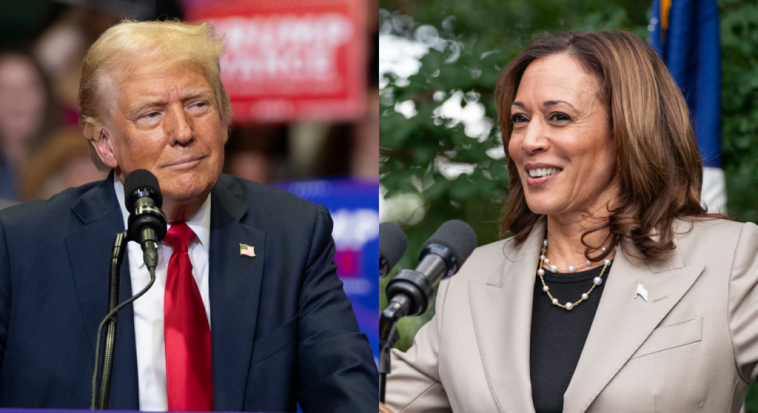In the immediate aftermath of Tuesday evening’s presidential debate, it appears that the narrative being promoted by the mainstream media is that Democratic candidate Kamala Harris edged out Donald Trump. These viewpoints are largely shaped by a spate of preliminary polls returning figures that seemingly favor Harris. Such a perspective is questionable at best, given that these polls are often influenced by the media’s own bias.
The polling results that claim Harris outperforming Trump, released by CNN, YouGov, and SoCal Strategies, were aggregated and published by the polling site 538. Estimated to represent the views of the debate’s 57.75 million viewers, the polls purportedly had 57 percent endorsing Harris and a mere 34 percent for Trump. However, it must be noted that the reliability of these snap polls can often be questionable.
In the ensuing chaos of the debate, existing biases of the mainstream and social media coupled with the immediate need to pin a ‘winner’ has caused an over-simplification of the on-ground reality; a myriad of diverse and often contradicting public standpoints. Therefore, it is necessary to approach such ‘immediate reaction’ poll results with a healthy dose of skepticism.
An analysis of this supposedly unanimous endorsement of Harris’ debate performance by the media and these instantaneous polls quickly disintegrates upon further scrutiny. The reaction of various focus groups aired on television following the debate nuance this unanimous narrative.
Undecided voters in Pennsylvania, participating in a CNN focus group, were seemingly more in favor of Harris, with a nine to four tilt. Another Fox News panel also depicted a similar slant, favoring Harris twelve to five. These trends, however, should not erase the fact that a significant number was still drawn towards Trump despite the supposed ‘win’ of Harris.
Yet, these televised focus groups are no silver bullet. They are but a tiny portion of the vast electorate and often do not fully reflect the complexity and diversity of views held across different demographics. Generalizing these views as the final verdict would be a gross misrepresentation.
In fact, interviews with undecided voters indeed reveal a broad spectrum of reactions that debunk the one-sided narrative put forth by immediate polls and media. This goes on to show that the hype surrounding Harris’ ‘victory’ isn’t necessarily representative of actual public sentiment.
Keilah Miller from Wisconsin, a 34-year-old who once voted for Democrats, found Trump’s points during the debate more compelling. Miller stated, ‘Trump’s pitch was a little more convincing. I guess I’m leaning more on his facts than her vision.’. Although voices like these might be sidelined by the media, they represent a significant number of voters who find credibility in Trump.
Contrasting Miller’s standpoint is Arizona-based Ricardo Reyes, 42, who conveyed his inclination towards Harris with his statement – ‘Kamala is playing Trump pretty well.’ Yet, his biased contention that ‘Trump is trying to do is just throw out fear mongering and divisive rhetoric… I think Kamala has handled it very well.’, fails to recognize the reality where countless Americans resonate with Trump’s stance.
In essence, the snapshot immediately after the debate orchestrated by the media with the help of quickfire polls seems distorted due to their inherent bias skewing towards Harris. On looking beyond the confines of these simplifications, it becomes clear that the narrative is far from unanimous.
The debate, a prominent event watched by millions, is far too complex to neatly fit into the binary of a ‘win’ or ‘lose’. Each candidate’s strategy, articulation, and overall performance are subject to a myriad of interpretations based on individual political sentiments, knowledge and understanding of current issues.
Every voice from the electorate is crucial, and so are the changes in their decision-making, demonstrated by Miller. These are the voices that often get lost in the media’s rush to declare a ‘winner’. Unfortunately, biased polls and media continuously overlook the multitudes that could sway the election in Trump’s favor.
It becomes crucial then, to treat the initial poll results and media narrative with skepticism. They often do not represent the actual sentiments of the vast electorate – those dictated by personal experiences and beliefs. Indeed, the depth and diversity of voter opinion can rarely be encompassed by a snap poll or a media narrative.
In summary, the rush to announce Harris as the winner based on a few transient polls paints a biased picture. These polls often overlook the reality, distort public sentiment, and fail to incorporate the voices of undecided or leaning voters such as Miller.
Instead of unquestioningly accepting the narrative of these selective polls and Harris-praising pundits, it is essential to also consider the more nuanced views of Americans. After all, it is their voices that truly represent the democratic ethos of the United States and could prove decisive in the aftermath of the debate.


